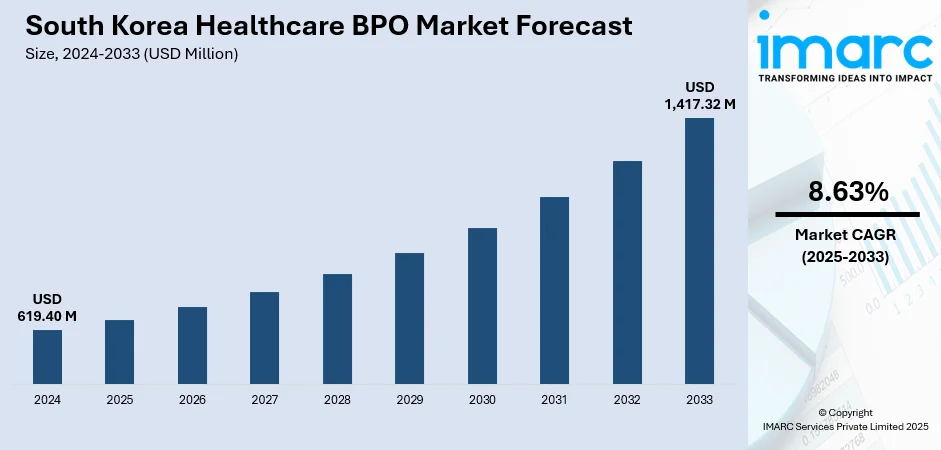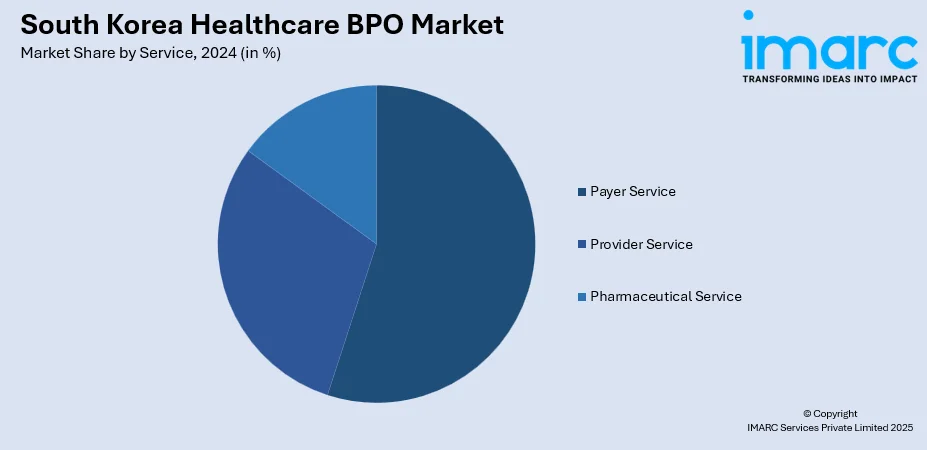
South Korea Healthcare BPO Market Size, Share, Trends and Forecast by Service and Region, 2025-2033
South Korea Healthcare BPO Market Overview:
The South Korea healthcare BPO market size reached USD 619.40 Million in 2024. Looking forward, the market is expected to reach USD 1,417.32 Million by 2033, exhibiting a growth rate (CAGR) of 8.63% during 2025-2033. The market is fueled by its sophisticated digital infrastructure, increasing demand for telemedicine, and necessity to automate administrative operations in a tightly regulated healthcare environment. Hospitals and clinics outsource more functions such as claims processing, patient scheduling, and medical transcription to become more efficient and free up resources to concentrate on core clinical services. Increasing elderly healthcare needs and medical tourism also propel demand for multilingual, technologically enabled BPO services, further fueling the South Korea healthcare BPO market share.
|
Report Attribute
|
Key Statistics
|
|---|---|
|
Base Year
|
2024
|
|
Forecast Years
|
2025-2033
|
|
Historical Years
|
2019-2024
|
| Market Size in 2024 | USD 619.40 Million |
| Market Forecast in 2033 | USD 1,417.32 Million |
| Market Growth Rate 2025-2033 | 8.63% |
South Korea Healthcare BPO Market Trends:
Growth of Remote Medical and Telehealth Services
South Korea's health BPO sector is transforming with the increase in remote medical and telehealth services. Famous for its advanced digital backbone and one of the world's fastest broadband networks, South Korea has a solid platform for telemedicine outsourcing. Health providers are increasingly outsourcing administrative functions like virtual scheduling of appointments, monitoring of patients remotely, and coordinating follow-up care. BPO firms have honed their services by integrating with nationally accepted electronic health record systems and adhering to standards established by the Korean Health Insurance Review & Assessment Service, ensuring seamless data flow and compliance. The COVID-19 pandemic accelerated adoption, prompting hospitals to outsource tele-triaging and medical consultation chat services. Even as demand returns to normal, the changing expectation of South Korean patients for convenient and affordable care fuels ongoing expansion in outsourced digital healthcare services. Additionally, government Smart Care Hospital efforts have brought into focus telehealth-capable BPO models, cementing remote medical work as central activities in Korea's health care outsourcing platform.

To get more information on this market, Request Sample
Specialization in Medical Claims Processing and Insurance Administration
Another notable trend influencing South Korea's healthcare BPO market is the growing emphasis on specialized medical claims handling and insurance management. Healthcare providers in South Korea must deal with complex billing laws, reimbursement guidelines, and compliance standards since the National Health Insurance Service oversees the country's universal health insurance program. BPO providers have established specialized staff conversant in Korea's medical coding regulations, insurance standards, and audit policies and offering assistance in claim filing, denial management, and appeal processing. By outsourcing these back-office tasks, hospitals and clinics can devote more energy to enhancing patient outcomes and leveraging clinical resources more effectively. Beyond that, private insurers have started outsourcing customer service, policy renewal processing, and premium calculations to BPO centers that understand the country's regulatory environment and documentation requirements. Specialization aids high-volume volume cycles during renewal seasons and peak care periods, a sign of the regulatory sophistication of South Korea and enabling domestic healthcare facilities to enhance operational productivity through outsourcing, which also contributes to the South Korea healthcare BPO market growth.
Integration of AI and Big Data in Clinical Support Functions
One of the defining themes in South Korea's healthcare BPO market is the blending of AI-powered clinical support and big data analysis with back-office operations. BPO providers collaborate with domestic AI startups and academic medical institutions, especially in Seoul and Daegu, to send machine-learning technologies to conduct duties like medical image triage, initial report creation, and predictive care analysis. These services tend to facilitate the support of radiology and pathology units through the marking of abnormal scans or the suggestion of follow-up scans, releasing specialist time and enhancing diagnostic accuracy. Moreover, clinical trial data management and patient recruitment for research are often outsourced to professional BPO teams with elaborate data platforms. With the government-driven initiative of smart hospital models and certification routes for AI medical devices in Korea, e.g., fast-track assessment for software-as-medical-device, outsourced clinical support services are taking center stage. Coupling regional technical know-how with compliance alignment, South Korea's healthcare BPO companies are becoming centers of innovation that bring cost-effective operations but also enhanced quality of care.
South Korea Healthcare BPO Market Segmentation:
IMARC Group provides an analysis of the key trends in each segment of the market, along with forecasts at the country and regional levels for 2025-2033. Our report has categorized the market based on service.
Service Insights:

- Payer Service
- Human Resource Management
- Claims Management
- Customer Relationship Management
- Operational and Administrative Management
- Care Management
- Provider Management
- Others
- Provider Service
- Patient Enrollment and Strategic Planning
- Patient Care Service
- Revenue Cycle Management
- Pharmaceutical Service
- Manufacturing Services
- Research and Development Services
- Non-clinical Services
The report has provided a detailed breakup and analysis of the market based on the service. This includes payer service (human resource management, claims management, customer relationship management, operational and administrative management, care management, provider management, and others), provider service (patient enrollment and strategic planning, patient care service, and revenue cycle management), and pharmaceutical service (manufacturing services, research and development services, and non-clinical services)
Regional Insights:
- Seoul Capital Area
- Yeongnam (Southeastern Region)
- Honam (Southwestern Region)
- Hoseo (Central Region)
- Others
The report has also provided a comprehensive analysis of all the major regional markets, which include Seoul Capital Area, Yeongnam (Southeastern Region), Honam (Southwestern Region), Hoseo (Central Region), and others.
Competitive Landscape:
The market research report has also provided a comprehensive analysis of the competitive landscape. Competitive analysis such as market structure, key player positioning, top winning strategies, competitive dashboard, and company evaluation quadrant has been covered in the report. Also, detailed profiles of all major companies have been provided.
South Korea Healthcare BPO Market Report Coverage:
| Report Features | Details |
|---|---|
| Base Year of the Analysis | 2024 |
| Historical Period | 2019-2024 |
| Forecast Period | 2025-2033 |
| Units | Million USD |
| Scope of the Report |
Exploration of Historical Trends and Market Outlook, Industry Catalysts and Challenges, Segment-Wise Historical and Future Market Assessment:
|
| Services Covered |
|
| Regions Covered | Seoul Capital Area, Yeongnam (Southeastern Region), Honam (Southwestern Region), Hoseo (Central Region), Others |
| Customization Scope | 10% Free Customization |
| Post-Sale Analyst Support | 10-12 Weeks |
| Delivery Format | PDF and Excel through Email (We can also provide the editable version of the report in PPT/Word format on special request) |
Key Questions Answered in This Report:
- How has the South Korea healthcare BPO market performed so far and how will it perform in the coming years?
- What is the breakup of the South Korea healthcare BPO market on the basis of service?
- What is the breakup of the South Korea healthcare BPO market on the basis of region?
- What are the various stages in the value chain of the South Korea healthcare BPO market?
- What are the key driving factors and challenges in the South Korea healthcare BPO market?
- What is the structure of the South Korea healthcare BPO market and who are the key players?
- What is the degree of competition in the South Korea healthcare BPO market?
Key Benefits for Stakeholders:
- IMARC’s industry report offers a comprehensive quantitative analysis of various market segments, historical and current market trends, market forecasts, and dynamics of the South Korea healthcare BPO market from 2019-2033.
- The research report provides the latest information on the market drivers, challenges, and opportunities in the South Korea healthcare BPO market.
- Porter's five forces analysis assist stakeholders in assessing the impact of new entrants, competitive rivalry, supplier power, buyer power, and the threat of substitution. It helps stakeholders to analyze the level of competition within the South Korea healthcare BPO industry and its attractiveness.
- Competitive landscape allows stakeholders to understand their competitive environment and provides an insight into the current positions of key players in the market.
Need more help?
- Speak to our experienced analysts for insights on the current market scenarios.
- Include additional segments and countries to customize the report as per your requirement.
- Gain an unparalleled competitive advantage in your domain by understanding how to utilize the report and positively impacting your operations and revenue.
- For further assistance, please connect with our analysts.
 Request Customization
Request Customization
 Speak to an Analyst
Speak to an Analyst
 Request Brochure
Request Brochure
 Inquire Before Buying
Inquire Before Buying




.webp)




.webp)












